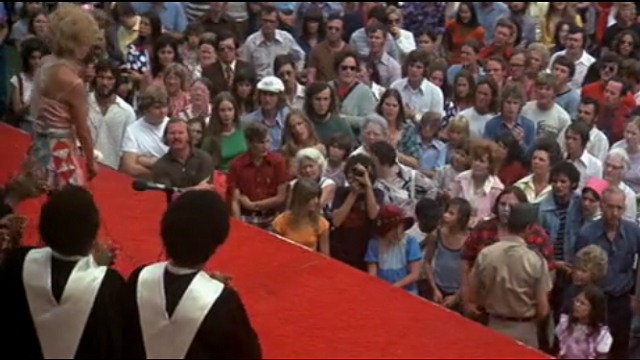The New Hollywood arose out of the dust from the collapse of 1960s’ countercultural revolution. Where the 1960s were fueled by a positive vision of the future, the 1970s were colored by the disillusionment that followed. In cinema, filmmakers were wrestling with the newly discovered knowledge that the light at the end of the tunnel may just be some asshole with a flashlight. From 1969’s Easy Rider through 1979’s Apocalypse Now, the New Hollywood movement struggled with the duality of seeing the horrors of the Vietnam War on their television set in lurid color and the idea that so many of their fellow Americans not only thought that was OK but actively supported the war or the politicians who did so. The acid-dropping hippy bikers were not killed by the government but by their fellow Americans, and the question of Apocalypse Now is wondering who was the real monster.
Robert Altman’s 1975 epic Nashville comes smack in the middle of the decade, and creates an American tapestry through the country music industry. In pure iconography, few musical genres are as wrapped up in the American identity as country-western. On one side of the movie, country music represents the wholesome nationalistic identity of the country. On the other is the industry, seeking to own, possess, commodify, and exploit the country genre and its representative American values. Nashville is less a critique of the musical genre, which Altman treats with an extreme reverence, than of the forces that seek to control it for personal gain.
Nashville is less about a specific narrative than a movie about ideas and themes. Its kaleidoscopic structure – encompassing dozens of characters and multiple parallel storylines – creates a fractured vision of the country from the very beginning. In the opening scenes Altman juxtaposes three separate storylines all vying for dominance of America’s heart. In the streets, an unseen politician’s campaign van spews political promises and catchphrases to anybody who cares to listen. In one studio, one country star is recording an effusively patriotic song. And in another, a white female is recording her next record with an all-black gospel choir. These stories and more circle each other for five days leading up to a big political rally where things come to a head.
Altman presents such a holistic view of the world, that Nashville can get reinterpreted based on the biases of the viewer. Is it cynical about country music, or the music industry? Is it interested in the characters or just using them as symbols for the various political theories he may or may not be pressuring? Is he cynical about politics and humanity’s presence in them, or is he optimistic about our ability to adapt? And, what is he saying about how all culture can function as an artistic form and as propaganda?
Its these questions that keep Nashville in the perennial discussion. Altman crafts the movie with such a balance that it could be seen as “a complete expression…of the humanity of Altman” and a film of pessimism, cynicism and sexism. The final effect is that all of these experiences are very real and create a broad image of a fracturing America pulling itself apart by unknown forces and trying to heal itself on the ground. Altman’s framing is, at times, so grandiose it seems to be encompassing every American in the frame. But, is he being cheeky or humane?
As a warning, this did come from the reactionary 1970s, where feminism was picking up steam to break through the patriarchy. As such, men were having a hard time dealing with women’s demands for autonomy. The female characters of Nashville are treated to some full-on nastiness ranging from emotional abuse to literal objectification to assassination. Whether Altman himself is being nastily sexist or observing and commenting on the nasty sexism of the world is the subject of many hot debates.
Nashville airs on TCM on Saturday 1/27 (Sunday Morning) at midnight EST on Turncer Classic Movies

